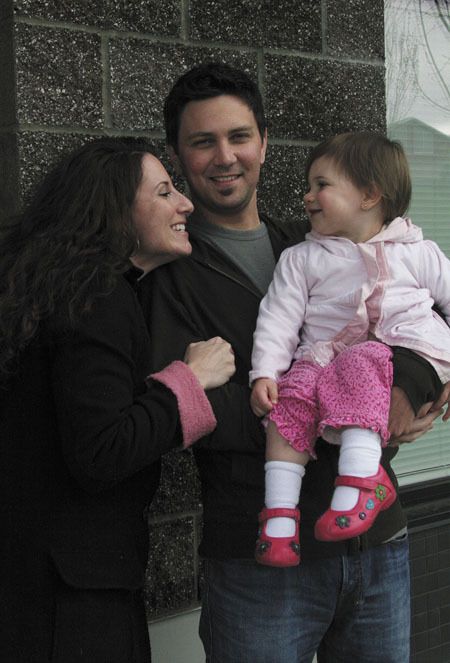When drivers ponder whether to check the organ donor box at the Department of Licensing counter, they may not think their decision is a big deal.
But to Snoqualmie resident Nate Gunderson, that check mark meant everything.
Last April, just after celebrating his daughter Mikaela’s first birthday, Nate, 32, began experiencing flu-like symptoms. A few days later, too sick to move, he went to hospital with wife Genevieve. Tests found that Nate had bacterial endocarditis, a staphylooccoci infection in his heart.
The family was stunned by how fast the deteriorating sickness struck Nate, an avid runner and health-conscious individual.
“It was sort of a perfect storm,” Genevieve Gunderson said.
Somehow, the infection entered his aortic valve. Soon, it was affecting every organ in his body, causing mini-strokes.
Doctors attempted to replace to valve twice, only to find that the infection had eaten a hole in the valve and was causing half of Nate’s blood to fall back into his heart chamber. His only hope was a heart transplant.
Nate waited in the hospital for a transplant candidate for 60 days. Finally, a match was found last July. With no major complications, he had a fairly rapid recovery.
When Nate got sick, he was barely able to walk. From a muscle-toned physique of 165 pounds, he dwindled to a frail, 130-pound stick figure. Two months later, all his muscle and body mass came back.
“Because of his health to begin with, and his youthfulness, being a good eater and exercising, he’s bounced back so well,” Genevieve said.
Almost one year and a couple of five-kilometer runs later, Nate has a healthy heart and feels like his old self again — with a few minor changes.
“What’s interesting is that Nate is healthier post-transplant because he has a strong, healthy, beating heart,” Geneveive said.
While most transplant families don’t learn much about their donors, the Gundersons know Nate’s donor was a 49-year-old woman. Her healthy heart improved Nate’s circulation, thickened his hair and even took away the dark circles from his eyes.
Seeing a different side of life after the surgery, Nate appreciates more because he almost lost it all.
“For a lot of people who have heart surgery, it’s their wake up call to get healthier,” Nate said. “It’s a huge challenge for a lot of people, and it becomes life changing.”
Besides emphasizing a healthy lifestyle, the Gundersons now see the importance of organ donors.
“You really get a unique perspective when you’re waiting for that organ,” Nate said. “You never think that’s going to happen when you’re 31. It could be you, a parent, a child, your brother or sister.”
Though Nate was at the top of the list for a transplant, what mattered was finding that match.
“He waited 60 days in critical care, completely bedridden, praying every night that someone would’ve checked that box or told their family that they wanted to be an organ donor,” Genevieve said.
Nate was told by his doctor that finding a match is like winning the lottery. Organ donation does not happen as often because many people are unaware of the importance and ease of telling their loved ones or checking that box on their driver’s license.
“Most families aren’t aware of their ailing families’ wishes of organ donation,” Genevieve said. “When it comes to the point where they have to make a decision themselves, a lot of the time they err on the side of letting one pass.”
Thus, the chances for someone to receive a heart or vital organ that could be a match becomes slimmer.
Nate now works with Donate Life, an organization founded by the transplant community to educate the public about organ, eye and tissue donation, motivating people to become donors.
“There’s a myth that ‘If I’m a donor, will they give me the same kind of care if I’m a donor versus if I’m not?’” Nate said. “But really, doctors don’t know whether someone is a donor until there’s a potential for a transplant.”
Learn about Donate Life at www.donatelife.net.



